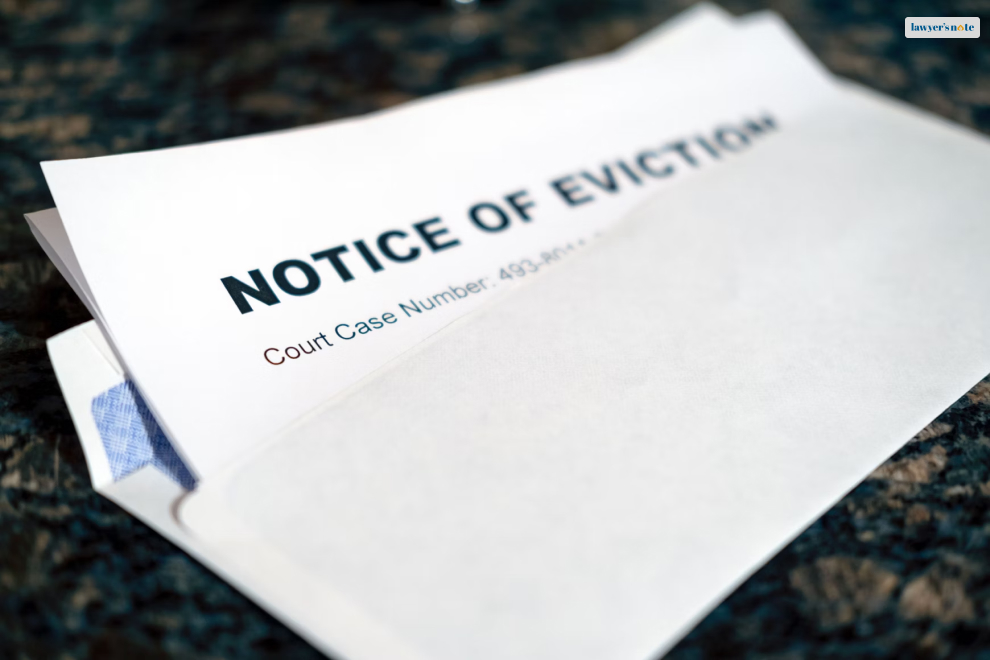Georgia Estate Planning Lawyers: Navigating Your Legacy with Expertise
Estate planning is a fundamental step for individuals looking to ensure their assets are managed and distributed according to their....
By LawyersNote
28 Feb 20241167 Views

Eviction is a nightmare that can dawn upon us at any point in time.
Are you someone who just got evicted? Or are you someone who’s thinking of evicting your stubborn tenant, who wouldn’t listen to a word you say?
Well, don’t worry we have got you covered. This article will deal with all the nitty-gritty of the reasons to evict a tenant or even how you can even peacefully do that. This blog will highlight all the legal obligations and help you learn them.
So, join us in this intricate journey of understanding evictions and how to avoid them.

This is a civil process when the landlord can easily remove a tenant from their property. The eviction primarily occurs when the tenant even stops paying the agreed-upon rent. When the rental agreement gets breached, specific solutions will be permitted by law.
Eviction in the US is governed by individual states and municipalities. Landlords are hence obliged to inform the tenants that they’re evicted with a notice. The notice should however specify the overall reasons for the number of days that remain before the proceedings of eviction.

At a glance, the eviction proceedings might even seem complicated and confusing. However, you can give or receive different types of eviction notices. Let’s see what they are:
In this case, this notice helps you as a tenant that you only have three days to pay rent. Otherwise, you must vacate the property. If you fail to pay the rent to your landlord, your landlord can file an Unlawful Detainer. However, after the expiration of the notice, the landlord shouldn’t take any money even if you pay it in full.
If you breach your lease agreement and engage in any form of prohibited conduct, then in that case you’re failing to abide by the covenant of the lease. For this, your landlord would give you a three-day notice to move out.
Once your landlord files the motion, then, in that case, you’ll only have three days to just reprimand that violation. However, if you fail to do so as well, your landlord can even file an Unlawful Detainer lawsuit.
This comes in handy when you commit some serious violations which you cannot correct anymore. In that case, your landlord can file an Unlawful Detainer lawsuit.
If your tenancy is based on a month-to-month rental agreement and you have resided in your rental unit for more than a year, then in that case, you have to serve a 30-day notice as given by your landlord.
This depends completely on that your tenancy is covered under the Tenant Protection Act of 2019 or not. It also highlights the fact that you’ve lived in the rental unit for more than one year. In order to understand that you have to serve a 60-day notice period in order to terminate such tenancy.
But, if your tenancy is not covered under the Tenant Protection Act of 2019, then your landlord won’t provide you with a proper reason to terminate the tenancy within 60-day notice. Your landlord won’t even retaliate or discriminate against you. Moreover, the notice must include certain statutory languages where your rights would be mentioned regarding reclaiming abandoned property.

Eviction is something that can easily put out a lot of mental pressure on you. Let’s see what the primary reasons are regarding why you can get evicted:
You as a landlord can begin the overall eviction proceeding if you’re unable to pay the rent. This is the most common reason for eviction. In this case, the landlord must provide you with a proper amount of time to catch up with the rent in 3 to 5 days. The landlord can hence file an eviction notice then after if you fail to pay the rent during this time period.
This is also a very common ground of eviction that takes place after a rent violation. When you violate the terms of the lease, then you can easily file for eviction. This legal notice would even state the violation and how you can help remedy it. If in any case, you cannot remedy the situation in the given time frame, the landlord can file an eviction lawsuit in court.
If as a tenant, you have damaged the property then your landlord can easily file for eviction. However, keep in mind that the amount of damage must be extremely significant and shouldn’t occur at no fault of your landlord. But, if the damage is minor and was only caused by a normal event of wear and tear, then your landlord cannot evict you.
If your landlord suspects and gets solid proof about you committing a criminal act, then, in that case, your landlord can easily evict you. This also happens when you violate the terms put forward in the lease agreement and becomes a nuisance to the other tenants of the property. In that case, your landlord has to do everything that will protect the property from damage and keep it safe for all the tenants.
Suppose, the police are called upon due to a series of disturbances; the landlord can hence be held liable if you were responsible for causing the disturbance. Additionally, if you engage in any sort of illegal activity, then in that case, as a landlord should be held liable for any damage that took place from the activity. For example, if you’re running prostitution or a meth lab out of your rental unit.
Domestic violence plays an important role that can even result in devastating consequences for the victims and their families and even their landlords. Sometimes it seems like eviction is the only option working out in this situation, it’s also extremely crucial to understand that there are other options of eviction even available.
In this case, you possess the right to give your victimized tenant a safe space and even file a restraining order against the guilty tenant. Remember, you as a landlord play an extremely crucial role in mitigating domestic violence. This would also be a great way to keep your property safe as well.
The landlord and tenant obligations primarily consist of those rights that adhere to the rental property. It is the basic responsibility of both tenants and landlords to adhere to it. The rights of the landlord even include getting a security deposit and keeping track of timely rental payments. The tenants even have to upkeep the rental unit and make it a habitable place to live.

Suppose your tenant wants to stay and even wants to reconcile and correct the problems, you can even go into arbitration and mediation in this matter to resolve the issue. These are the two most common alternative dispute resolution methods and typically move faster. Moreover, it also costs much less than that of any alternative eviction lawsuits.
Furthermore, you can also succeed in negotiating your tenant’s repayment and relocation, through mediation. It can happen that your tenant might be undergoing a temporary financial hardship. In that case, you can come up with a plan called the pay-and-stay plan where you can easily catch up with the past-due rent. This would also help protect your rights to receive eviction and if you miss future rents, then you can easily help your tenant with it.

Normally, the process of eviction primarily begins with a violation notice. It then continues to the court. However, it ends up with the forced removal of you as a tenant. There are 5 easy steps that talk about the legal process of eviction. They are:
Before a landlord removes you as a tenant and your things, it’s integral that you know about this beforehand. Your landlord must bring an eviction action with a legal document. The most common notice among these is:
As your landlord will be filing for eviction, they will automatically become the plaintiff. They can file either an Unlawful Detainer, Forcible Entry, or Detainer against you in some jurisdictions.
Generally, larger jurisdictions have separate legal dockets about these types of actions. Make sure that your landlord files the correct lawsuit in the proper county.
It’s important that your landlord provides you with a proper notice of the overall eviction proceedings.
Sometimes, the provisions allow you as a tenant to submit a written answer for your complaint. You can either answer that or even forfeit the right to trial by not attending the court.
This, in turn, would lead to a default judgment.
The writ of possession gives you a couple of days to move out on your own. However, if you do not move out even after that, local law enforcement can come in and interfere with this. Once you move out or are removed from the premises, your landlord will finally be able to change the locks.
Evictions can be extremely hard at times. However, there are several rental assistance programs as well throughout the country. Try to get in touch with those and catch up with your eviction.
Read Also:
Barsha Bhattacharya is a senior content writing executive. As a marketing enthusiast and professional for the past 4 years, writing is new to Barsha. And she is loving every bit of it. Her niches are marketing, lifestyle, wellness, travel and entertainment. Apart from writing, Barsha loves to travel, binge-watch, research conspiracy theories, Instagram and overthink.
View Post
Estate planning is a fundamental step for individuals looking to ensure their assets are managed and distributed according to their....
By LawyersNote
28 Feb 2024
So, what are tender types of easements within the framework of real estate laws in the United States? Worry not;....
By LawyersNote
24 Jan 2024
When you first look at the word, you are taken aback as it seems like a term taken straight out....
By LawyersNote
21 Dec 2023